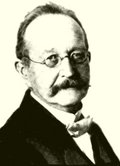In honour of Gunkel’s birthday…

“Genre research in Psalms is nonnegotiable, not something one can execute or ignore according to preference. Rather it is the foundational work with which there can be no certainty in the remainder.
It is the firm ground from which everything else must ascend.”
– Hermann Gunkel
Perhaps no scholar has influenced the modern study of the book of Psalms as much as Hermann Gunkel. His pioneering form-critical work on the psalms sought to provide a new and meaningful context in which to interpret individual psalms — not by looking at their historical background or their literary context within the Psalter (which he didn’t see as significant), but by bringing together psalms of the same genre (Gattung) from throughout the Psalter. Even though Psalms scholarship has refined and critiqued his approach and have moved on to different approaches, Gunkel’s form-critical legacy remains firmly entrenched in modern scholarship and is the default starting point for most studies of the Psalter.
The Genres of the Psalms
According to Gunkel, for psalms to be considered as part of the same genre (Gattung) three conditions had to be met:
- the psalms had to have a similar setting in life (Sitz im Leben), basis in worship, a common cultic setting, or at least originally derive from one;
- they had to be characterized by common thoughts, feelings, and moods; and
- they required a shared diction, style, and structure — a language related to form (Formensprache). This feature provides the signals of the particular genre.
Working with these criteria, Gunkel isolated a number of different genres or types of psalms. In his earlier work he highlighted four primary types of psalms (hymns, community laments, individual thanksgiving psalms, and individual laments), with various subcategories, as well as several mixed forms. In his later work, completed by Joachim Begrich, he identified six major types (hymns, enthronement psalms, communal complaints, royal psalms, individual complaints, and individual thanksgiving psalms) and a number of smaller genres and mixed types. I have tended to follow the later classification, with modifications as noted. Also note that some psalms are found in more than one category. This is especially the case with sub-genres since Gunkel wasn’t consistent in how he dealt with them.
For this summary I have relied primarily on these two works:
- Hermann Gunkel (completed by Joachim Begrich), Introduction to Psalms: The Genres of the Religious Lyric of Israel (Mercer University Press, 1998; translation of Einleitung in die Psalmen: die Gattungen der religiösen Lyrik Israels [Vandenhoeck & Ruprecht, 1985, 1933]; Buy from Amazon.ca | Buy from Amazon.com).
- Hermann Gunkel, The Psalms: A Form-Critical Introduction (Fortress Press, 1967; translation of his article in Die Religion in Geschichte und Gegenwart [2nd ed; J.C.B. Mohr (Paul Siebeck), 1930]; Buy from Amazon.ca | Buy from Amazon.com)
I have also included this summary as a PDF document below (it is a handout I put together for my Psalms class). Feel free to download it and use it as long as you keep the ascription in the first footnote. (While I have double checked the references, please let me know if you find any errors or omissions.)
I. Hymns
A. Hymns in General
Psalms 8; 19; 29; 33; 65; 67; 68; 96; 98; 100; 103; 104; 105; 111; 113; 114; 117; 135; 136; 139; 145-150.
Form
- Introduction: A call to praise, sing, and rejoice to Yahweh in some form.
- Body: The reasons why Yahweh should be praised (often introduced by כי, kî, “for”).
- His qualities and attributes.
- His regular or repeated actions, including his works in creation and conservation of cosmos and his works in history, especially for Israel.
- Conclusion: renewed summons to praise.
Sitz im Leben
Hymns were sung as part of worship on diverse occasions, including sacred festivals as well at other times, perhaps by a choir or an individual singer.
B. Songs of Zion
Psalms 46; 48; 76; 84; 87; 122.
These psalms tend to lack a proper introduction. They praise Yahweh by praising Jerusalem, addressing the holy place, and calling down blessings upon it. They were sung at particular occasions that celebrated Jerusalem’s majesty and future eschatological significance.
C. Psalms of Yahweh’s Enthronement
Psalms 47; 93; 96:10-13; 97; 99.
Form
- Often begin with the words יהוה מלך, “Yahweh has become king.”
- Contain many calls to rejoice.
- Have brief references to Yahweh’s deeds, depicted as just now taking place.
- Give descriptions of what his reign will mean to Israel and the world.
- Present the idea that a new world kingdom is coming.
Sitz im Leben
These psalms were used as part of Israel’s worship, likely including an enthronement festival in which Yahweh is glorified as king. These psalms were given a prophetic, eschatological, reinterpretation in their final stages.
II. Lament/Complaint Psalms
A. Communal Complaint Psalms
Psalms 44; (58); (60); 74; 79; 80; 83; (106); (125).
Form
- Calling upon Yahweh by name (usually in the vocative)
- Lamenting complaints over the misfortune; almost always political in nature.
- Supplications and petitions to Yahweh to transform the misfortunes.
- Thoughts aimed to excite confidence in the suppliant or to move Yahweh to action, such as his honour or the sake of his name.
- Often end with a certainty of hearing.
Sitz im Leben
The setting of these psalms are days of national fasting and/or complaint festivals brought on by various national calamities, such as war, exile, pestilence, drought, famine, and plagues.
B. Individual Complaint Psalms
1) Individual Laments in General
Psalms 3; 5; 6; 7; 13; 17; 22; 25; 26; 27:7-14; 28; 31; 35; 38; 39; 42-43; 54-57; 59; 61; 63; 64; 69; 70; 71; 86; 88; 102; 109; 120; 130; 140; 141; 142; 143.
Form
Laments will typically include the following element, though not necessarily in the same order:
- Summons to Yahweh.
- Complaint/Lament proper, often preceded by a description of the prayer.
- Considerations inducing Yahweh to intervene, whether by challenging Yahweh’s honour, exciting his anger by citing the enemies’ words, or by the nature of the complaint itself.
- Petition/Entreaty. This is the most significant part of the complaint psalm. May be of a general nature or may be quite specific (confessional petitions, petitions of innocence, etc.).
- Conviction of being heard (present only in some Psalms) and/or a vow.
Sitz im Leben
The setting in life is difficult to determine due to the formulaic character of the language in laments. Originally derives from the worship service and then later were used as spiritual songs of the individual. These psalms were occasioned by apparently life-threatening situations rather than everyday life; such situations may include illness, misfortune, persecution from enemies — though one needs to be careful about taking the images too literally.
2) Psalms Protesting Innocence
Psalms 5; 7; 17; 26. These psalms have an accentuated assurance of innocence, and even in some cases a qualified self-curse.
3) Psalms of Confession
Psalms 51; 130 (Psalms expressing national penitence include Psalms 78; 81; 106; cf. also Ezra 9:9-15; Neh 9:9-38; Dan 9:4-19). These psalms are characterized by a painful awareness of having sinned against Yahweh and deserving punishment. In this light they ask forgiveness and appeal for God’s grace.
4) Psalms of Cursing and Vengeance
Psalm 109, among others. These psalms strive for retaliation against enemies.
5) Psalms of Trust
Psalms 4; 11; 16; 23; 27:1-6; 62; 131 (Psalm 125 is a national song of trust). These psalms reformulate the lament psalms and shift their focus to an expression of trust and confidence, so much so that often the complaint, petition, and certainty of hearing are displaced. They often speak of Yahweh in the third person.
III. Royal Psalms
Psalms 2; 18; 20; 21; 45; 72; 101; 110; 132; 144:1-11; cf. 89:47-52.
Form
Formally Royal psalms are of different types, though in all cases they are “concerned entirely with kings.” Some of their distinguishing elements include:
- Praises of the king.
- Affirmations of Yahweh’s favour to the king.
- Prayers for the king (or his own prayer) and royal oracles.
- Portrayals of the king’s righteousness and piety.
Sitz im Leben
These psalms were performed at some sort of court festivity, where they were performed in the presence of the king and his dignitaries. Specific occasions may be enthronement/accession festivals and anniversaries, victory over an enemy, healing from an illness, among others.
IV. Thanksgiving Psalms
A. Thanksgivings of the Individual
Psalms 18; 30; 32; 34; 40:2-12; 41; 66:1-7; 92; (100); (107); 116; 118; 138.
Form
- An expanded Introduction, declaring the intention to thank God.
- Narration of the trouble, usually to the guests of the celebration. The psalmist usually recounts:
- his trouble (thus they are akin to Laments)
- his calling upon God
- his deliverance
- Acknowledgment/proclamation of Yahweh’s deliverance; usually directed towards others.
- In many cases, the psalm ends with an Announcement of the thank-offering.
Sitz im Leben
Since the word usually translated “thanksgiving” is the same word used for “thank offering” (תודה; todah; e.g., Ps 50:14, 23; Jonah 2:9), it is clear that these psalms were intended to be used in a cultic setting. It is thought that the individual, in the presence of the worshiping congregation (e.g., 22:22; 26:12), would testify personally to God’s saving deeds, accompanied with a ritual act and meal. Eventually, these psalms freed themselves from the actual sacrifice.
B. Thanksgivings of the Community
Psalms 66:8-12; 67; 124; 129.
These psalms are parallel in form to the individual thanksgiving psalms. The life setting for these psalms was likely a cultic celebration at the temple in remembrance of God’s help and intervention.
V. Wisdom Psalms
Psalms 1; 37; 49; 73; 91; 112; 127; 128; 133.
While there are wisdom elements found in psalms of a variety of genres, there are psalms which exhibit a concentration of wisdom themes to be considered a distinct type. As such, these psalms do not exhibit a single formal pattern, but share a number of characteristics, including:
- Psalmist speaks of his words as wisdom, instruction, etc.
- He describes the “fear of Yahweh.”
- He addresses his hearers as “sons.”
- He warns, teaches, and uses figures, question and answer techniques, beatitudes, descriptions of Yahweh’s ways.
VI. Smaller Genres and Mixed Types
A. Pilgrimage Psalms
Only one complete example remains, Psalm 122. These psalms were used at the beginning of a pilgrimage as well as once the pilgrim had reached his or her destination.
B. Psalms Using Ancient Stories (Legends) of Israel
Psalms 78; 105; 106. These psalms are subsumed under other literary types (e.g., Ps 105 is a hymn), but may be grouped together because they share a number of common characteristics:
- The Narration of Yahweh’s deeds and/or the sins of Israel (of Heilsgeschichte)
- The Exhortation (as in Deuteronomy)
C. Psalm Liturgies
Psalms 15; 20; 24; 14/53; 66; 81; 82; 85; 95; 107; 115; 118; 121; 126; 132; 134. These psalms are characterized by their antiphonal structure, particularly suited for corporate worship.
D. Miscellaneous
Psalms 36; 50; 52; 75; 82; 108.
E. Mixed Psalms
Psalms 9-10; 12; 77; 90; 94; 119; 123; 137.
Conclusions
As I mentioned above, Gunkel’s classification is just a starting point. Much has changed since Gunkel did his seminal studies of the Psalms, though few studies have the Psalms have had as lasting of influence. Perhaps in future posts I will highlight some of the changes and trends since Gunkel.
Here is the handout in PDF form:
Please feel free to use it as you see fit — just remember to keep the ascription in the first footnote (And please let me know if you find any errors or omissions).
Also available in Portuguese:


 Happy Canada Day!
Happy Canada Day!